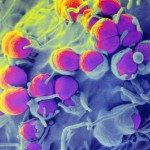Link to Pubmed [PMID] – 8911138
Immunology 1996 Sep;89(1):41-5
In several experimental models, synthetic peptides were shown to activate efficiently cytotoxic T-lymphocyte (CTL) responses and therefore represent an attractive strategy to develop new vaccines. However, the mechanisms by which they induce CTL responses are not yet fully understood. Several studies using 15 16-mer peptides previously demonstrated that CD4 helper T cells are required to induce optimal CTL responses with synthetic peptides. However, recently it was suggested that shorter 8 12-mer peptides could have an increased in vivo immunogenicity. In the present study, we therefore investigated if such optimal-length peptides still require CD4+ T-cell help to activate CTL responses. To address this question three synthetic peptides containing different viral CTL epitopes were injected into mice depleted of CD4+ or CD8+ T cells using specific monoclonal antibodies or into mice genetically deficient in those T-cell populations. Our results clearly established that activation of CTL responses by those short optimal peptides does not require CD4+ T-cell help and therefore suggested that high-density binding of peptides to major histocompatibility complex class I molecules on the surface of antigen-presenting cells is required for direct activation of CD8+ T cells, independently of CD4+ T-cell help.
